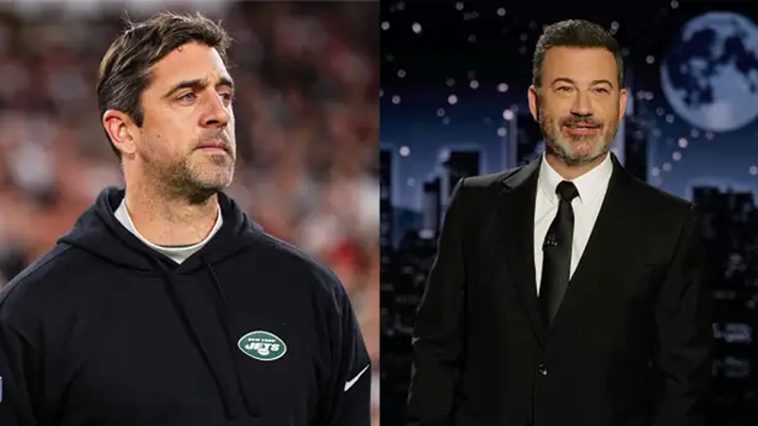The recent clash between Aaron Rodgers and Jimmy Kimmel has attracted much attention, but not necessarily for the reasons one might assume. The host of ‘What’s Wright? with Nick Wright” believes that the significant issue doesn’t concern potential business issues between Disney subsidiaries or legal threats from Kimmel. Instead, he suggests that the noteworthy aspect lies in Rodgers’ ability to cast controversial accusations without any substantial backlash.
Nick Wright presents Aaron Rodgers, a well-known sports figure, as having transitioned from an eccentric conspiracy theorist to a disruptive personality in the cultural sphere with seemingly no repercussions. He points out the double standard that if a basketball player like Steph Curry made shocking insinuations against a famous actor, it would be taken with the utmost seriousness, rather than merely focusing on potential business ramifications.
Rodgers had stirred up the pot of his rivalry with Kimmel further by speculating about Kimmel’s name appearing in some newly revealed court papers linked to a notorious criminal. He made a rather vague comment implying that Kimmel, along with others, was hoping that this particular information will remain hidden. This statement was made during a discussion on ‘The Pat McAfee Show’, adding a new layer to their ongoing dispute.
Moreover, Nick Wright is critical of Rogers’ tendency towards conjectures and the unfortunate implications of such actions. He cautions that Rodgers is becoming the spokesperson for some of the most irrational and unstable individuals amongst us by providing a voice for their misguided views and theories within the realm of professional sports.
Wright boldly indicates Rodgers’ thought processes, likening them to an unhealthy obsession with implausible theories and misinformation often seen in online communities. He uses the term ‘Alphabet gangsters’ that Rodgers referenced in a medical context as an example, stating that the term is typically associated with LGBTQ+ discussions, highlighting Rodgers’ seemingly uninformed statements.
Further making his point, Wright suggests that Rodgers’ misguided observations not only lack any meaningful connection to the pharmaceutical industry – an industry he frequently criticizes – but also that he would likely retract these comments if he fully comprehended their implications.
Wright conveys that Rodgers’ public assertions have tapered towards the controversial and the ridiculous, broadcasting unfounded theories to an audience that might not necessarily be seeking such narrative. Still, Rodgers makes these claims during his weekly appearances, often lasting an hour, where he holds considerable influence.
Rodgers’ explosive comments led to an apology from Pat McAfee, the host of the show in which Rodgers made his remarks. However, Rodgers himself has not issued any statements or apologies following Kimmel’s response on social media. This has contributed to the escalating tension and public outcry regarding his public statements, his intentions, and his attitude.
Nick Wright poses a thought-provoking question about the public’s desensitization towards such shocking actions from a highly regarded athlete like Rodgers. He equates the public’s numbness to the ongoing controversial statements from Rodgers as an acceptance of his behavior, regardless of how outrageous or unfounded his allegations might be.
Wright emphasizes his concerns by putting the situation into a broader perspective. The individual making these outrageous allegations isn’t merely a public persona but a premier athlete in America’s favorite sport. He not only holds a paramount platform amongst league players but also exerts immense influence over his team.
He continues, criticizing the fact that someone of Rodgers’ stature has made such serious and public allegations about someone he doesn’t like, casually labeling him a ‘pedophile’. This situation, Wright laments, shows a stark degradation in the level of discourse expected from high-profile individuals.
The end result, according to Wright, is the transformation of one of the sports world’s most prominent voices into a conduit for illogical, half-baked theories. This unfortunate shift in dynamics raises questions about the impact of such actions on the sports community and the general public.
Aaron Rodgers represents a significant portion of the sports world. His influence extends beyond his performance on the field to unintended and perhaps undesired territories. His inclination towards conspiracy theories and his accompaniment of radical voices paint a troubling picture for his followers.
Rodgers’ statements reflect the challenges that arise when an influential sporting figure dabbles in speculation and controversy. His words weigh heavily not just because of his image as an athlete but also due to his platform and the impact it can potentially have on his audience.
Certainly, it’s an issue that requires a thoughtful examination of our cultural tendencies and the consequences of letting such unfounded statements go unchecked. Attitudes within the sports industries, fan bases, and the public sphere are all subject to influence by such high-profile individuals. It calls for a critical examination of our attitudes towards our role models and their actions.


